2013秋至2014春《中考小复习》:人教版七年级下册英语Unit1-3复习课件(共50张PPT)
文档属性
| 名称 | 2013秋至2014春《中考小复习》:人教版七年级下册英语Unit1-3复习课件(共50张PPT) |  | |
| 格式 | zip | ||
| 文件大小 | 818.1KB | ||
| 资源类型 | 教案 | ||
| 版本资源 | 人教新目标(Go for it)版 | ||
| 科目 | 英语 | ||
| 更新时间 | 2013-12-30 11:20:03 | ||
图片预览

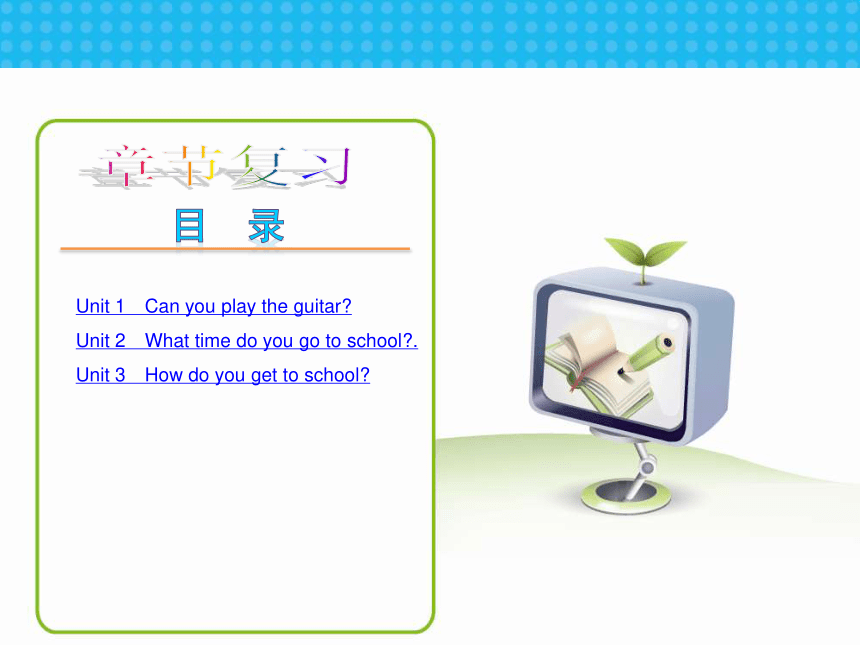

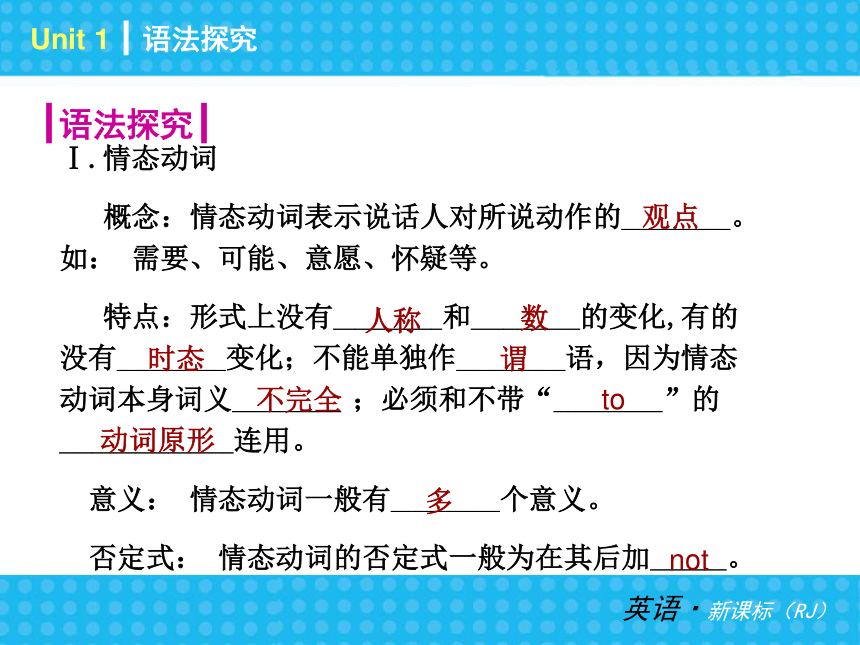
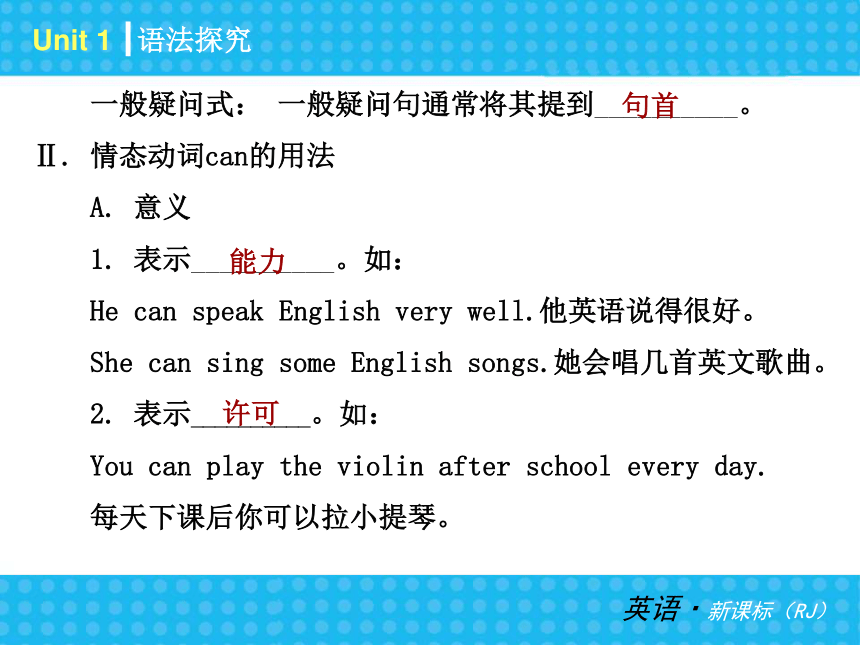


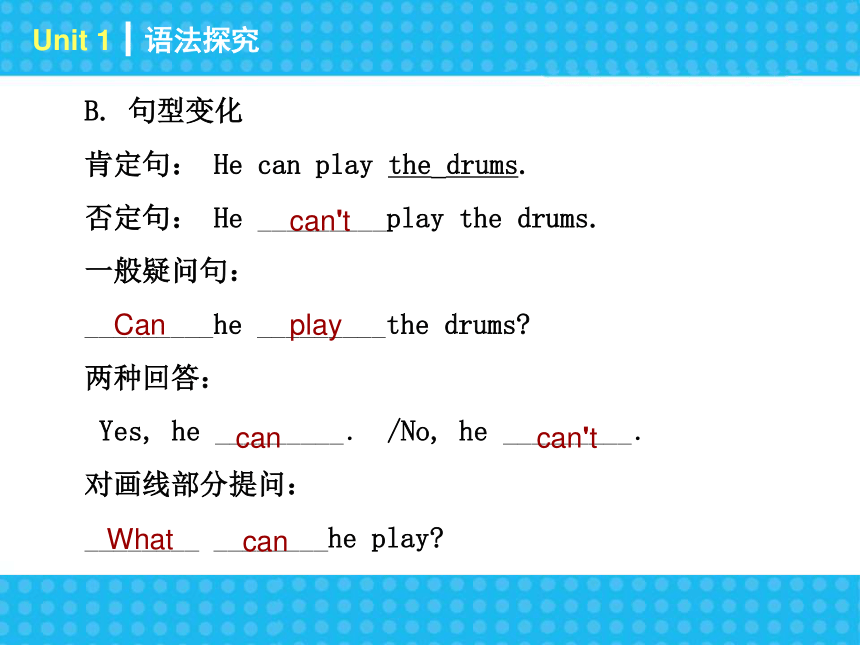
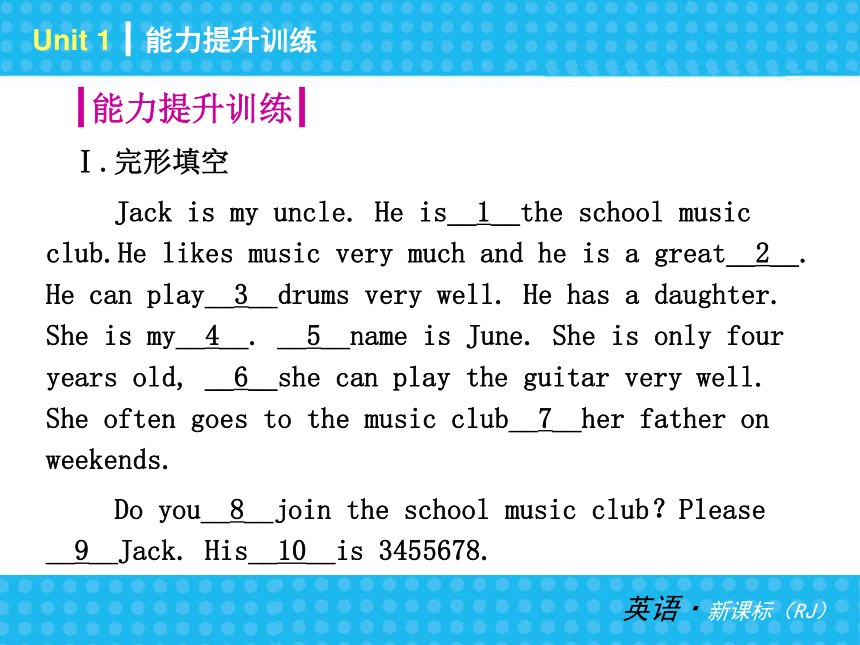
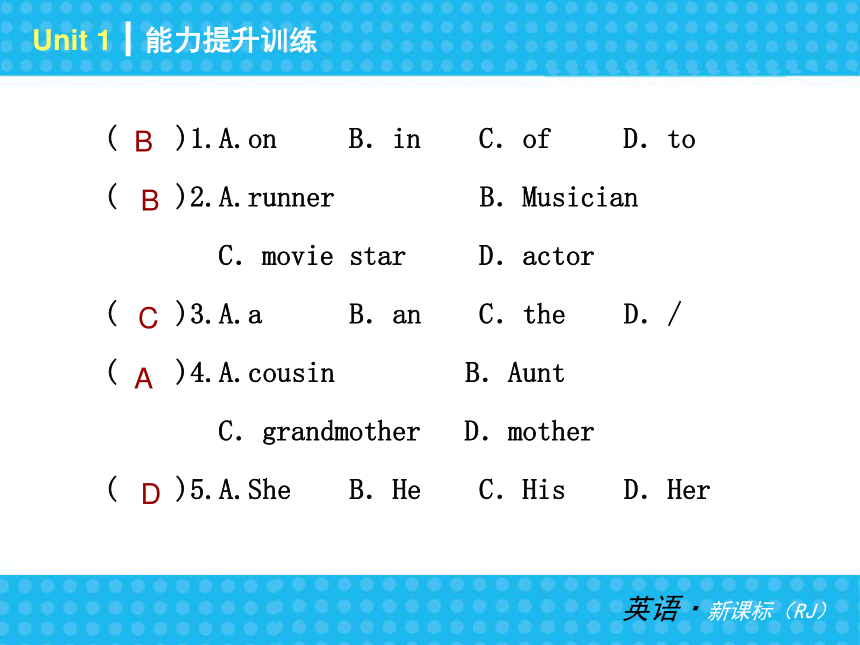
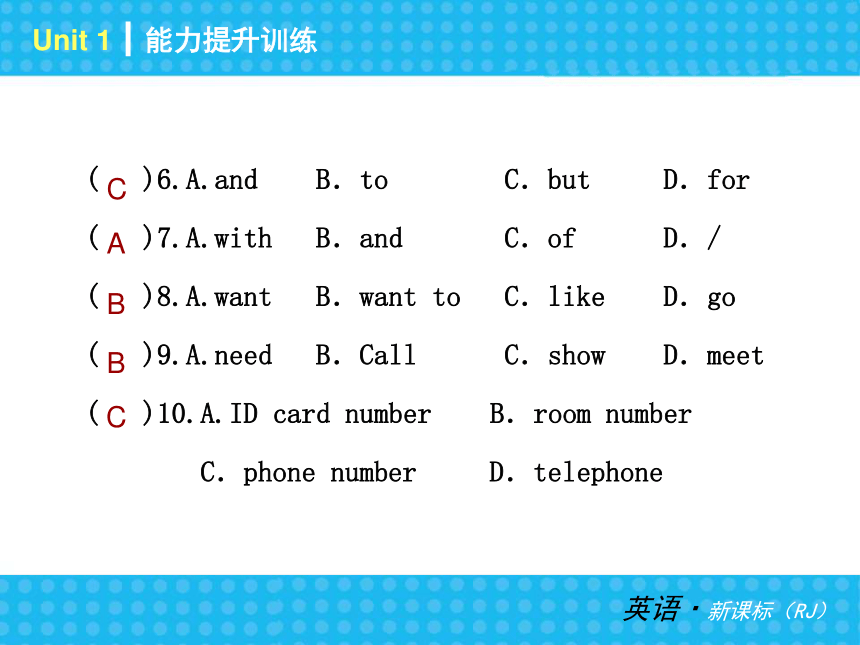
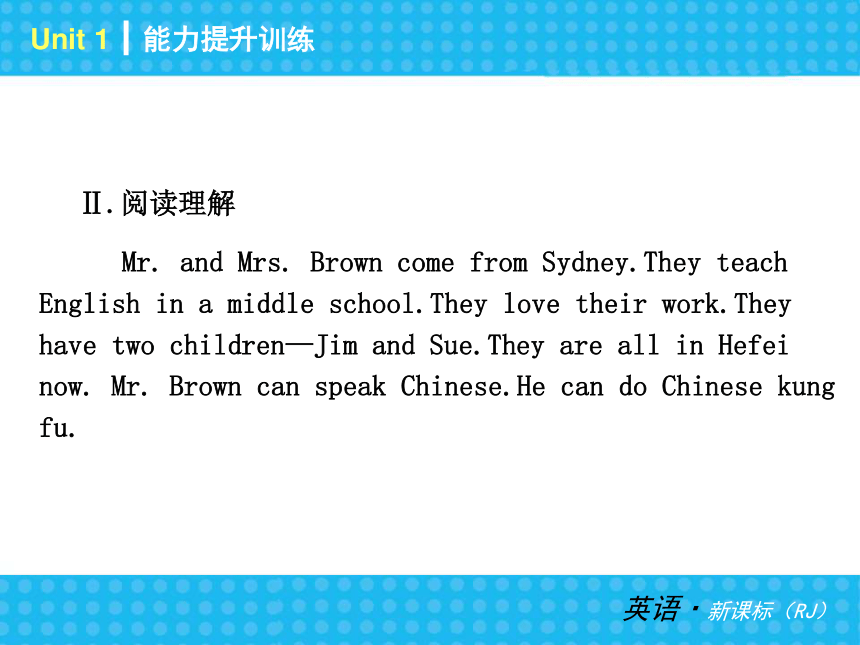
文档简介
课件50张PPT。英语(新目标)新课标(RJ)七年级下册目 录Unit 1 Can you play the guitar?
Unit 2 What time do you go to school?.
Unit 3 How do you get to school? 章节复习英语·新课标(RJ)Unit 1 Can you play the guita? 英语·新课标(RJ)Unit 1 ┃ 语法探究┃语法探究┃ Ⅰ.情态动词
概念:情态动词表示说话人对所说动作的__________。如: 需要、可能、意愿、怀疑等。
特点:形式上没有__________和__________的变化,有的没有__________变化;不能单独作__________语,因为情态动词本身词义__________ ;必须和不带“__________”的________________连用。
意义: 情态动词一般有__________个意义。
否定式: 情态动词的否定式一般为在其后加_______。
观点人称数时态谓不完全to动词原形多not英语·新课标(RJ) 一般疑问式: 一般疑问句通常将其提到__________。
Ⅱ. 情态动词can的用法
A. 意义
1. 表示__________。如:
He can speak English very well.他英语说得很好。
She can sing some English songs.她会唱几首英文歌曲。
2. 表示__________。如:
You can play the violin after school every day.
每天下课后你可以拉小提琴。Unit 1 ┃语法探究 句首能力许可Unit 1 ┃ 语法探究Students can‵t take cell phones or Mp3 players to school.学生不允许带手机或MP3到学校。
3. 表示__________。如:
Can you tell me an English story?
你能给我讲个英语故事吗?
Could you help me with my English?
你能帮我学英语吗?
温馨提示: 上句中的could 是can 的过去式,用在一般现在时的句子中,表示比can更客气的请求。请求Unit 1 ┃ 语法探究4. can't 表示__________ 。如:
—Is that Mr. Smith?
那是史密斯先生吗?
—That can't be him. He is in New York now.
那不可能是他。他现在在纽约呢。 英语·新课标(RJ)否定猜测Unit 1 ┃ 语法探究B. 句型变化
肯定句: He can play the_drums.
否定句: He _________play the drums.
一般疑问句:
_________he _________the drums?
两种回答:
Yes, he _________. /No, he _________.
对画线部分提问:
________ ________he play? can'tCanplaycancan'tWhatcan┃能力提升训练┃
Ⅰ.完形填空
Jack is my uncle. He is__1__the school music club.He likes music very much and he is a great__2__. He can play__3__drums very well. He has a daughter. She is my__4__. __5__name is June. She is only four years old, __6__she can play the guitar very well. She often goes to the music club__7__her father on weekends.
Do you__8__join the school music club?Please __9__Jack. His__10__is 345-5678.Unit 1 ┃ 能力提升训练英语·新课标(RJ)英语·新课标(RJ) ( )1.A.on B.in C.of D.to
( )2.A.runner B.Musician
C.movie star D.actor
( )3.A.a B.an C.the D./
( )4.A.cousin B.Aunt
C.grandmother D.mother
( )5.A.She B.He C.His D.HerUnit 1 ┃ 能力提升训练BBCAD( )6.A.and B.to C.but D.for
( )7.A.with B.and C.of D./
( )8.A.want B.want to C.like D.go
( )9.A.need B.Call C.show D.meet
( )10.A.ID card number B.room number
C.phone number D.telephoneUnit 1 ┃ 能力提升训练英语·新课标(RJ)CABB C Ⅱ.阅读理解
Mr. and Mrs. Brown come from Sydney.They teach English in a middle school.They love their work.They have two children—Jim and Sue.They are all in Hefei now. Mr. Brown can speak Chinese.He can do Chinese kung fu.Unit 1 ┃ 能力提升训练英语·新课标(RJ)英语·新课标(RJ)Unit 1 ┃ 能力提升训练 Mr. Brown likes swimming and reading. But Mrs. Brown likes painting and playing Chinese chess. They often go swimming in the afternoon and play chess in the evening. On Sunday morning Mr. Brown do Chinese kung fu. Jim and Sue like playing games. They often play games with Chinese boys and girls.
Jim's uncle, Green works on a farm near Sydney. He likes swimming, too. He also wants to work in Hefei. But he can't speak Chinese. So he is still in Australia and goes to Chinese classes every week.
( )1.Where are Jim and Sue from?
A.They're from America.
B.They're from Canada.
C.They're from Australia.
D.They're from England.
( )2.What does Mrs. Brown like?
A.She likes reading and swimming.
B.She likes teaching and playing games.
C.She likes painting and playing Chinese chess.
D.She likes playing chess and do Chinese kung fu.CCUnit 1 ┃ 能力提升训练英语·新课标(RJ)Unit 1 ┃ 能力提升训练英语·新课标(RJ)( )3.What does Sue's uncle do?
A.He's a worker. B.He's a driver.
C.He's a farmer. D.He's a teacher.
( )4.What does Sue's uncle like?
A.He likes reading.
B.He likes playing chess.
C.He likes his work.
D.He likes swimming.CD英语·新课标(RJ)Unit 1 ┃ 能力提升训练( )5.Who work in different countries now?
A.Mr. and Mrs. Brown.
B.Mr. Brown and his uncle.
C.Mrs. Brown and her uncle.
D.Mr. Brown and his brother.D英语·新课标(RJ)Unit 1 ┃ 易错点针对训练┃易错点针对训练┃
Ⅰ. 单项选择
( )1. —Can you ________ him to stop smoking?
—Sure.
A.tell B.say C.talk D.speak
( )2. The little boy ________ English very________.
A.speaks; good B.speaks; well
C.says; well D.tells; wellABⅡ.用good或 well 填空
He is a ________ student; he is ________ and
studies________.
2. The food smells ________ and it sells ________.
Ⅲ.使用适当的介词填空
1. Running is good________ a man's health.
2. Parents aren't always good ________ their children. Unit 1 ┃ 易错点针对训练英语·新课标(RJ)goodwellwellgoodwellforwith3. The lady is very good ________ her cat.
4. If you are not good _________ driving, you'd
better keep the car away.
Ⅳ.使用所给词的适当形式填空
1. The book is very ____________ (interest).
2. I need a__________ (relax) holiday.
3. Are you __________ (interest) in music?
4. He doesn't feel __________ (relax) when he is at
work.
Unit 1 ┃ 易错点针对训练英语·新课标(RJ)toatinterestingrelaxinginterestedrelaxed英语·新课标(RJ)Unit 2 What time do you go to school ? 英语·新课标(RJ)Unit 2 ┃ 语法探究┃语法探究┃Ⅰ. 一般现在时态特殊疑问句的结构
1. 结构: 特殊疑问词+ be + 主语?
特殊疑问词+ 助动词do/does+ 主语+ 实义动词?
When/What time is the party?
When do you go to school?
What time does he go to work?
常用的特殊疑问词:________ /________ ________ (什么时候), ________ (什么地方), ________ (谁), ________ (谁的), ________ (如何)。whenwhat timewherewhowhosehow英语·新课标(RJ)2. 对画线部分提问:
(1)They get dressed at_six.
→________ ________ ________ they get dressed?
(2)She takes a walk at_nine.
→________ ________ she _______ a walk?
(3)He usually swims in_the_lake.
→________ ________ he ________ ?
(4)Jack goes to school on_foot.
→ ________ ________ Jack ________ to school?
温馨提示: what time 对具体某一时刻进行提问;when 对笼统时间进行提问。Unit 2 ┃ 语法探究WhattimedoWhendoestakeWheredoesswimHowdoesgoUnit 2 ┃ 语法探究Ⅱ. 英语时间表示法
1. 使用数字( ________ 数 + ________数)。如:
7:20 seven twenty ; 8: 55 eight fifty-five。
2. 使用介词(past或to)。
当分钟数≤30分钟时,使用介词________ , “分钟数+ past + 小时数”。如:
9:10 ten minutes past nine; 10: 30 half past ten;
当分钟数>30分钟时,使用介词________ ,“(60-分钟数)+ to + (小时数+1)”。 如:
11: 40 twenty minutes to twelve.小时分钟pasttoUnit 2 ┃ 语法探究英语·新课标(RJ)温馨提示:
(1)特殊时间段的表示法: 30分钟可以使用________代替;15
分钟可以使用________代替。如:
5: 30 half past five; 9: 45 a quarter to ten。
(2)在某一时刻使用介词________ 。
(3)提问时间使用: “What time is it?” 或“What's the
time?” halfquarterat英语·新课标(RJ)Ⅲ. 英语中的频度副词的用法
英语中常用的频度副词及含义: ________(总是;一直), ________ (通常), ________ (从来没有),___________ (有时
候) 等,常用在行为动词前。如:
I usually take a walk after dinner.
晚饭后我经常散步。
He never goes to school late.
他上学从不迟到。
They sometimes eat lunch at school.
他们有时候在学校吃午饭。Unit 2 ┃ 语法探究alwaysusuallyneversometimes┃能力提升训练┃
Ⅰ.完形填空
I __1__ a school girl.My school is far __2__ my home.I must __3__ up very early every morning. I usually go to school by __4__.Every day it __5__ me about half an hour to get there.I have no time __6__ breakfast at home.I often have some bread __7__ breakfast on my bike.I don't want to __8__ late for the morning exercises.I have __9__ at school.Sometimes I play basketball with my classmates after school.I often get __10__ at about 6:00.Unit 3 ┃ 能力提升训练英语·新课标(RJ)( )1.A.be B.am C.is D.are
( )2.A.at B.to C.in D.from
( )3.A.get B.getting
C.gets D.to get
( )4.A.a bike B.the bike
C.bike D.bikes
( )5.A.gets B.brings
C.uses D.takesUnit 3 ┃ 能力提升训练英语·新课标(RJ)BDACD( )6.A.has B.have
C.having D.to have
( )7.A.to B.for C.like D.with
( )8.A.be B./ C.go D.come
( )9.A.supper B.the supper
C.breakfast D.lunch
( )10.A.to school B.school
C.to home D.homeUnit 3 ┃ 能力提升训练DBADD英语·新课标(RJ)Unit 2 ┃ 能力提升训练Ⅱ.阅读理解
Hans says to his friend Kurt, “I'm going to drive to London.”
Kurt says, “Driving to London is very hard.You aren't going to find your hotel.” But Hans is not afraid.He drives to Calais, puts his car on the ship, takes it off at Dover, and drives to London.
He stops near the city and looks at his map. Then he drives into London, but he can't find his hotel. He 英语·新课标(RJ)Unit 2 ┃ 能力提升训练drives round and round for an hour, and then he stops and gets out of his car. A taxi comes, and Hans stops it. “Take me to the Brussels Hotel, ” he says. But he can't get into the taxi: he gets back into his car. The taxi man laughs, but then he drives to the Brussels Hotel, and Hans follows him in his car. They reach the hotel in two minutes. Unit 2 ┃ 能力提升训练英语·新课标(RJ)( )1.Hans goes to London by ________.
A.Car B.sea
C.Air D.both sea and land
( )2.Hans loses his way in ________.
A.Calais B.London C.Dover D.Brussels
( )3.Hans can not find his hotel because ________.
A.he has a map
B.he has no map
C.it is not easy to find the way
D.he is not good at drivingDBCUnit 2 ┃ 能力提升训练 ( )4.Hans stops a taxi and ________.
A.follows it to the hotel
B.gets into it
C.laughs
D.drives it to the hotel
( )5.Hans finds his hotel in ________.
A.an hour
B.two minutes
C.an hour and two minutes
D.more than one hour英语·新课标(RJ)AB英语·新课标(RJ)Unit 2 ┃ 易错点针对训练┃易错点针对训练┃
Ⅰ.单项选择
( )1. —Either you or she ________ on duty today,
don't forget it.
—OK, I won't.
A.is B.am C.are D.be
( )2. —My parents ask me to finish my homework
________ after school.
—It's a good habit.
A.one B.first C.ones D.onceABⅡ.用first, one, ones 或 once 填空
1. He is the ________ in the English test.
2. —Please have an apple.
—Thanks, I have ________.
3. These apples are green, and the red ________ are
in the basket.
4. He cleans his car ________ a week.
Ⅲ.用所给词的适当形式填空
1. Either she or I ________ (be) busy this week. Unit 2 ┃ 易错点针对训练英语·新课标(RJ)firstoneonesonceam 2. Neither you nor he ________ (be) at work now.
3. There ________ (be) two books and a pen on the desk.
4. ________(arrive) at school on time, he gets up very early.
Ⅳ.同义句转换
He has a job in town.
He has ________ ________ ________ ________ in town. Unit 2 ┃ 易错点针对训练英语·新课标(RJ)isareTo arrivea piece of work英语·新课标(RJ)Unit 3 How do you go to school?英语·新课标(RJ)Unit 3 ┃ 语法探究┃语法探究┃Ⅰ. how引导的一般现在时态的特殊疑问句
1. 特殊疑问词how提问动作的________。如:
—How do you go to school? “你如何上学呢?”
—I ride my bike to school. “我骑自行车去上学。”
2. 表达动作行为的方式, 使用动词take (乘坐)、ride (乘车) 、walk(步行)、fly(乘飞机)等;使用介词by等。主语+ take/ride/walk/fly + to + 地点=主语+ go to + 地点+ by + 交通工具。 如: 方式 (1)He takes the plane to Beijing.
=He __________ _________Beijing.
=He goes to Beijing by _____________.
(2)She walks to school.
=She goes to school _________ _________.
Ⅱ. how far 与 how long的区别
how far是提问两地之间的_________,how long 用来提问 _______________或某个事物的_________。如: Unit 3 ┃ 语法探究fliestoplane/aironfoot距离时间的长短长度 It is five kilometers from my home to my school. (距离)
→_______ _______ is it from your home to your school?
The river is 1,000 kilometers long. (距离)
→ _______ _______ is the river?
The meeting is 2 hours. (时间段)
→ _______ _______ is the meeting? Unit 3 ┃ 语法探究HowfarHowlongHowlongUnit 3 ┃ 语法探究Ⅲ. hundred的两种用法
1. hundreds of + 名词复数,“数以百记的,成百上千的,”表示一种“___________”;
2. 数字+ hundred +名词复数, “……百”,表示“___________”。如:
There are hundreds of people on the island.
岛屿上有成百上千的人。
He has five hundred interesting books.
他有五百本有趣的书籍。约数确切数Unit 3 ┃ 能力提升训练┃能力提升训练┃
Ⅰ.完形填空
Some day little cars may take the place of today's cars. If everyone__1__such a little car in the future, there will be less pollution in the air and there will be more parking space in cities, and the streets will be__2__crowded.The space now for one car of the usual size can hold__3__one such little car.
The little cars will__4__much less to own and to drive.Driving will be__5__, too, because these little cars can go only 50 kilometers an hour.Unit 3 ┃ 能力提升训练英语·新课标(RJ) The cars of the future will be fine for going __6__the city, but they will not be useful for going far away. The little car needs only two batteries(电池)—one battery for the motor, and __7__for the horn and the lights.
If we still __8__ the big cars along with the small ones, we will need to __9__ two kinds of roads. Some roads will be used __10__ the big fast cars, and other roads will be needed for the small, slower ones.英语·新课标(RJ)( )1.A.drives B.sits C.makes D.sells
( )2.A.more B.less C.much D.fewer
( )3.A.at most B.no more
C.less than D.more than
( )4.A.pay B.Spend C.cost D.have
( )5.A.faster B.harder
C.safer D.more dangerousUnit 3 ┃ 能力提升训练ABDCC( )6.A.over B.Around C.from D.past
( )7.A.another B.One
C.the other D.others
( )8.A.think B.use C.park D.love
( )9.A.build B.put C.find D.open
( )10.A.to B.as C.for D.inUnit 3 ┃ 能力提升训练英语·新课标(RJ)BCBACⅡ.阅读理解
Unit 3 ┃ 能力提升训练英语·新课标(RJ)Unit 3 ┃ 能力提升训练( )1.The train from Beijing to Shenyang leaves at
________.
A.5:05 B.6:35 C.8:35 D.17:50
( )2.We have to spend ________ on the train if we
go to Shenyang from Beijing.
A.17 hours and 50 minutes
B.24 hours and 25 minutes
C.6 hours and 35 minutes
D.11 hours and 15 minutesBD英语·新课标(RJ)Unit 3 ┃ 能力提升训练( )3.If you want to go to Chengdu from Taiyuan, you
can take the ________ train.
A.No.11 B.No.185 C.No.186 D.No.271
( )4.The No.186 train arrives in Taiyuan at________.
A.10:50 a.m. B.1:50 p.m.
C.5:05 a.m. D.5:05 p.m.
( )5.It takes________from Tianjin to Beijing by train.
A.about 2 hours B.half an hour
C.about an hour D.more than 2 hoursBCA英语·新课标(RJ)Unit 3 ┃ 易错点针对训练┃易错点针对训练┃
Ⅰ. 单项选择
( )1.The island is the biggest one ________ islands.
A.among hundred of
B.among three hundred
C.between hundreds of
D.between three hundreds
( )2.________ takes the old man a long time ________
the door of his own.
A.It; to open B.It; opening
C.That; to open D.That; opens
BAUnit 3 ┃ 易错点针对训练英语·新课标(RJ)Ⅱ.用among或between填空
1.In the word “map”, letter “a” stands ________
letter “m”and letter “p”.
2. Look! There is a man standing ________ the
students.He is our teacher.
Ⅲ.根据汉语提示完成句子
1. He has ________ ________(两百本) storybooks at
home.
2. __________ ________(成百上千的) people are
relaxing on the square on hot summer nights. betweenamongtwo hundredHundreds ofUnit 3 ┃ 易错点针对训练英语·新课标(RJ)Ⅳ.同义句转换
1. The girl is five years old.
She is a _________________ girl.
2. He spends half an hour watching TV every
night.
______ ______him thirty minutes ______
______TV every night.five-year-oldIt takestowatch
Unit 2 What time do you go to school?.
Unit 3 How do you get to school? 章节复习英语·新课标(RJ)Unit 1 Can you play the guita? 英语·新课标(RJ)Unit 1 ┃ 语法探究┃语法探究┃ Ⅰ.情态动词
概念:情态动词表示说话人对所说动作的__________。如: 需要、可能、意愿、怀疑等。
特点:形式上没有__________和__________的变化,有的没有__________变化;不能单独作__________语,因为情态动词本身词义__________ ;必须和不带“__________”的________________连用。
意义: 情态动词一般有__________个意义。
否定式: 情态动词的否定式一般为在其后加_______。
观点人称数时态谓不完全to动词原形多not英语·新课标(RJ) 一般疑问式: 一般疑问句通常将其提到__________。
Ⅱ. 情态动词can的用法
A. 意义
1. 表示__________。如:
He can speak English very well.他英语说得很好。
She can sing some English songs.她会唱几首英文歌曲。
2. 表示__________。如:
You can play the violin after school every day.
每天下课后你可以拉小提琴。Unit 1 ┃语法探究 句首能力许可Unit 1 ┃ 语法探究Students can‵t take cell phones or Mp3 players to school.学生不允许带手机或MP3到学校。
3. 表示__________。如:
Can you tell me an English story?
你能给我讲个英语故事吗?
Could you help me with my English?
你能帮我学英语吗?
温馨提示: 上句中的could 是can 的过去式,用在一般现在时的句子中,表示比can更客气的请求。请求Unit 1 ┃ 语法探究4. can't 表示__________ 。如:
—Is that Mr. Smith?
那是史密斯先生吗?
—That can't be him. He is in New York now.
那不可能是他。他现在在纽约呢。 英语·新课标(RJ)否定猜测Unit 1 ┃ 语法探究B. 句型变化
肯定句: He can play the_drums.
否定句: He _________play the drums.
一般疑问句:
_________he _________the drums?
两种回答:
Yes, he _________. /No, he _________.
对画线部分提问:
________ ________he play? can'tCanplaycancan'tWhatcan┃能力提升训练┃
Ⅰ.完形填空
Jack is my uncle. He is__1__the school music club.He likes music very much and he is a great__2__. He can play__3__drums very well. He has a daughter. She is my__4__. __5__name is June. She is only four years old, __6__she can play the guitar very well. She often goes to the music club__7__her father on weekends.
Do you__8__join the school music club?Please __9__Jack. His__10__is 345-5678.Unit 1 ┃ 能力提升训练英语·新课标(RJ)英语·新课标(RJ) ( )1.A.on B.in C.of D.to
( )2.A.runner B.Musician
C.movie star D.actor
( )3.A.a B.an C.the D./
( )4.A.cousin B.Aunt
C.grandmother D.mother
( )5.A.She B.He C.His D.HerUnit 1 ┃ 能力提升训练BBCAD( )6.A.and B.to C.but D.for
( )7.A.with B.and C.of D./
( )8.A.want B.want to C.like D.go
( )9.A.need B.Call C.show D.meet
( )10.A.ID card number B.room number
C.phone number D.telephoneUnit 1 ┃ 能力提升训练英语·新课标(RJ)CABB C Ⅱ.阅读理解
Mr. and Mrs. Brown come from Sydney.They teach English in a middle school.They love their work.They have two children—Jim and Sue.They are all in Hefei now. Mr. Brown can speak Chinese.He can do Chinese kung fu.Unit 1 ┃ 能力提升训练英语·新课标(RJ)英语·新课标(RJ)Unit 1 ┃ 能力提升训练 Mr. Brown likes swimming and reading. But Mrs. Brown likes painting and playing Chinese chess. They often go swimming in the afternoon and play chess in the evening. On Sunday morning Mr. Brown do Chinese kung fu. Jim and Sue like playing games. They often play games with Chinese boys and girls.
Jim's uncle, Green works on a farm near Sydney. He likes swimming, too. He also wants to work in Hefei. But he can't speak Chinese. So he is still in Australia and goes to Chinese classes every week.
( )1.Where are Jim and Sue from?
A.They're from America.
B.They're from Canada.
C.They're from Australia.
D.They're from England.
( )2.What does Mrs. Brown like?
A.She likes reading and swimming.
B.She likes teaching and playing games.
C.She likes painting and playing Chinese chess.
D.She likes playing chess and do Chinese kung fu.CCUnit 1 ┃ 能力提升训练英语·新课标(RJ)Unit 1 ┃ 能力提升训练英语·新课标(RJ)( )3.What does Sue's uncle do?
A.He's a worker. B.He's a driver.
C.He's a farmer. D.He's a teacher.
( )4.What does Sue's uncle like?
A.He likes reading.
B.He likes playing chess.
C.He likes his work.
D.He likes swimming.CD英语·新课标(RJ)Unit 1 ┃ 能力提升训练( )5.Who work in different countries now?
A.Mr. and Mrs. Brown.
B.Mr. Brown and his uncle.
C.Mrs. Brown and her uncle.
D.Mr. Brown and his brother.D英语·新课标(RJ)Unit 1 ┃ 易错点针对训练┃易错点针对训练┃
Ⅰ. 单项选择
( )1. —Can you ________ him to stop smoking?
—Sure.
A.tell B.say C.talk D.speak
( )2. The little boy ________ English very________.
A.speaks; good B.speaks; well
C.says; well D.tells; wellABⅡ.用good或 well 填空
He is a ________ student; he is ________ and
studies________.
2. The food smells ________ and it sells ________.
Ⅲ.使用适当的介词填空
1. Running is good________ a man's health.
2. Parents aren't always good ________ their children. Unit 1 ┃ 易错点针对训练英语·新课标(RJ)goodwellwellgoodwellforwith3. The lady is very good ________ her cat.
4. If you are not good _________ driving, you'd
better keep the car away.
Ⅳ.使用所给词的适当形式填空
1. The book is very ____________ (interest).
2. I need a__________ (relax) holiday.
3. Are you __________ (interest) in music?
4. He doesn't feel __________ (relax) when he is at
work.
Unit 1 ┃ 易错点针对训练英语·新课标(RJ)toatinterestingrelaxinginterestedrelaxed英语·新课标(RJ)Unit 2 What time do you go to school ? 英语·新课标(RJ)Unit 2 ┃ 语法探究┃语法探究┃Ⅰ. 一般现在时态特殊疑问句的结构
1. 结构: 特殊疑问词+ be + 主语?
特殊疑问词+ 助动词do/does+ 主语+ 实义动词?
When/What time is the party?
When do you go to school?
What time does he go to work?
常用的特殊疑问词:________ /________ ________ (什么时候), ________ (什么地方), ________ (谁), ________ (谁的), ________ (如何)。whenwhat timewherewhowhosehow英语·新课标(RJ)2. 对画线部分提问:
(1)They get dressed at_six.
→________ ________ ________ they get dressed?
(2)She takes a walk at_nine.
→________ ________ she _______ a walk?
(3)He usually swims in_the_lake.
→________ ________ he ________ ?
(4)Jack goes to school on_foot.
→ ________ ________ Jack ________ to school?
温馨提示: what time 对具体某一时刻进行提问;when 对笼统时间进行提问。Unit 2 ┃ 语法探究WhattimedoWhendoestakeWheredoesswimHowdoesgoUnit 2 ┃ 语法探究Ⅱ. 英语时间表示法
1. 使用数字( ________ 数 + ________数)。如:
7:20 seven twenty ; 8: 55 eight fifty-five。
2. 使用介词(past或to)。
当分钟数≤30分钟时,使用介词________ , “分钟数+ past + 小时数”。如:
9:10 ten minutes past nine; 10: 30 half past ten;
当分钟数>30分钟时,使用介词________ ,“(60-分钟数)+ to + (小时数+1)”。 如:
11: 40 twenty minutes to twelve.小时分钟pasttoUnit 2 ┃ 语法探究英语·新课标(RJ)温馨提示:
(1)特殊时间段的表示法: 30分钟可以使用________代替;15
分钟可以使用________代替。如:
5: 30 half past five; 9: 45 a quarter to ten。
(2)在某一时刻使用介词________ 。
(3)提问时间使用: “What time is it?” 或“What's the
time?” halfquarterat英语·新课标(RJ)Ⅲ. 英语中的频度副词的用法
英语中常用的频度副词及含义: ________(总是;一直), ________ (通常), ________ (从来没有),___________ (有时
候) 等,常用在行为动词前。如:
I usually take a walk after dinner.
晚饭后我经常散步。
He never goes to school late.
他上学从不迟到。
They sometimes eat lunch at school.
他们有时候在学校吃午饭。Unit 2 ┃ 语法探究alwaysusuallyneversometimes┃能力提升训练┃
Ⅰ.完形填空
I __1__ a school girl.My school is far __2__ my home.I must __3__ up very early every morning. I usually go to school by __4__.Every day it __5__ me about half an hour to get there.I have no time __6__ breakfast at home.I often have some bread __7__ breakfast on my bike.I don't want to __8__ late for the morning exercises.I have __9__ at school.Sometimes I play basketball with my classmates after school.I often get __10__ at about 6:00.Unit 3 ┃ 能力提升训练英语·新课标(RJ)( )1.A.be B.am C.is D.are
( )2.A.at B.to C.in D.from
( )3.A.get B.getting
C.gets D.to get
( )4.A.a bike B.the bike
C.bike D.bikes
( )5.A.gets B.brings
C.uses D.takesUnit 3 ┃ 能力提升训练英语·新课标(RJ)BDACD( )6.A.has B.have
C.having D.to have
( )7.A.to B.for C.like D.with
( )8.A.be B./ C.go D.come
( )9.A.supper B.the supper
C.breakfast D.lunch
( )10.A.to school B.school
C.to home D.homeUnit 3 ┃ 能力提升训练DBADD英语·新课标(RJ)Unit 2 ┃ 能力提升训练Ⅱ.阅读理解
Hans says to his friend Kurt, “I'm going to drive to London.”
Kurt says, “Driving to London is very hard.You aren't going to find your hotel.” But Hans is not afraid.He drives to Calais, puts his car on the ship, takes it off at Dover, and drives to London.
He stops near the city and looks at his map. Then he drives into London, but he can't find his hotel. He 英语·新课标(RJ)Unit 2 ┃ 能力提升训练drives round and round for an hour, and then he stops and gets out of his car. A taxi comes, and Hans stops it. “Take me to the Brussels Hotel, ” he says. But he can't get into the taxi: he gets back into his car. The taxi man laughs, but then he drives to the Brussels Hotel, and Hans follows him in his car. They reach the hotel in two minutes. Unit 2 ┃ 能力提升训练英语·新课标(RJ)( )1.Hans goes to London by ________.
A.Car B.sea
C.Air D.both sea and land
( )2.Hans loses his way in ________.
A.Calais B.London C.Dover D.Brussels
( )3.Hans can not find his hotel because ________.
A.he has a map
B.he has no map
C.it is not easy to find the way
D.he is not good at drivingDBCUnit 2 ┃ 能力提升训练 ( )4.Hans stops a taxi and ________.
A.follows it to the hotel
B.gets into it
C.laughs
D.drives it to the hotel
( )5.Hans finds his hotel in ________.
A.an hour
B.two minutes
C.an hour and two minutes
D.more than one hour英语·新课标(RJ)AB英语·新课标(RJ)Unit 2 ┃ 易错点针对训练┃易错点针对训练┃
Ⅰ.单项选择
( )1. —Either you or she ________ on duty today,
don't forget it.
—OK, I won't.
A.is B.am C.are D.be
( )2. —My parents ask me to finish my homework
________ after school.
—It's a good habit.
A.one B.first C.ones D.onceABⅡ.用first, one, ones 或 once 填空
1. He is the ________ in the English test.
2. —Please have an apple.
—Thanks, I have ________.
3. These apples are green, and the red ________ are
in the basket.
4. He cleans his car ________ a week.
Ⅲ.用所给词的适当形式填空
1. Either she or I ________ (be) busy this week. Unit 2 ┃ 易错点针对训练英语·新课标(RJ)firstoneonesonceam 2. Neither you nor he ________ (be) at work now.
3. There ________ (be) two books and a pen on the desk.
4. ________(arrive) at school on time, he gets up very early.
Ⅳ.同义句转换
He has a job in town.
He has ________ ________ ________ ________ in town. Unit 2 ┃ 易错点针对训练英语·新课标(RJ)isareTo arrivea piece of work英语·新课标(RJ)Unit 3 How do you go to school?英语·新课标(RJ)Unit 3 ┃ 语法探究┃语法探究┃Ⅰ. how引导的一般现在时态的特殊疑问句
1. 特殊疑问词how提问动作的________。如:
—How do you go to school? “你如何上学呢?”
—I ride my bike to school. “我骑自行车去上学。”
2. 表达动作行为的方式, 使用动词take (乘坐)、ride (乘车) 、walk(步行)、fly(乘飞机)等;使用介词by等。主语+ take/ride/walk/fly + to + 地点=主语+ go to + 地点+ by + 交通工具。 如: 方式 (1)He takes the plane to Beijing.
=He __________ _________Beijing.
=He goes to Beijing by _____________.
(2)She walks to school.
=She goes to school _________ _________.
Ⅱ. how far 与 how long的区别
how far是提问两地之间的_________,how long 用来提问 _______________或某个事物的_________。如: Unit 3 ┃ 语法探究fliestoplane/aironfoot距离时间的长短长度 It is five kilometers from my home to my school. (距离)
→_______ _______ is it from your home to your school?
The river is 1,000 kilometers long. (距离)
→ _______ _______ is the river?
The meeting is 2 hours. (时间段)
→ _______ _______ is the meeting? Unit 3 ┃ 语法探究HowfarHowlongHowlongUnit 3 ┃ 语法探究Ⅲ. hundred的两种用法
1. hundreds of + 名词复数,“数以百记的,成百上千的,”表示一种“___________”;
2. 数字+ hundred +名词复数, “……百”,表示“___________”。如:
There are hundreds of people on the island.
岛屿上有成百上千的人。
He has five hundred interesting books.
他有五百本有趣的书籍。约数确切数Unit 3 ┃ 能力提升训练┃能力提升训练┃
Ⅰ.完形填空
Some day little cars may take the place of today's cars. If everyone__1__such a little car in the future, there will be less pollution in the air and there will be more parking space in cities, and the streets will be__2__crowded.The space now for one car of the usual size can hold__3__one such little car.
The little cars will__4__much less to own and to drive.Driving will be__5__, too, because these little cars can go only 50 kilometers an hour.Unit 3 ┃ 能力提升训练英语·新课标(RJ) The cars of the future will be fine for going __6__the city, but they will not be useful for going far away. The little car needs only two batteries(电池)—one battery for the motor, and __7__for the horn and the lights.
If we still __8__ the big cars along with the small ones, we will need to __9__ two kinds of roads. Some roads will be used __10__ the big fast cars, and other roads will be needed for the small, slower ones.英语·新课标(RJ)( )1.A.drives B.sits C.makes D.sells
( )2.A.more B.less C.much D.fewer
( )3.A.at most B.no more
C.less than D.more than
( )4.A.pay B.Spend C.cost D.have
( )5.A.faster B.harder
C.safer D.more dangerousUnit 3 ┃ 能力提升训练ABDCC( )6.A.over B.Around C.from D.past
( )7.A.another B.One
C.the other D.others
( )8.A.think B.use C.park D.love
( )9.A.build B.put C.find D.open
( )10.A.to B.as C.for D.inUnit 3 ┃ 能力提升训练英语·新课标(RJ)BCBACⅡ.阅读理解
Unit 3 ┃ 能力提升训练英语·新课标(RJ)Unit 3 ┃ 能力提升训练( )1.The train from Beijing to Shenyang leaves at
________.
A.5:05 B.6:35 C.8:35 D.17:50
( )2.We have to spend ________ on the train if we
go to Shenyang from Beijing.
A.17 hours and 50 minutes
B.24 hours and 25 minutes
C.6 hours and 35 minutes
D.11 hours and 15 minutesBD英语·新课标(RJ)Unit 3 ┃ 能力提升训练( )3.If you want to go to Chengdu from Taiyuan, you
can take the ________ train.
A.No.11 B.No.185 C.No.186 D.No.271
( )4.The No.186 train arrives in Taiyuan at________.
A.10:50 a.m. B.1:50 p.m.
C.5:05 a.m. D.5:05 p.m.
( )5.It takes________from Tianjin to Beijing by train.
A.about 2 hours B.half an hour
C.about an hour D.more than 2 hoursBCA英语·新课标(RJ)Unit 3 ┃ 易错点针对训练┃易错点针对训练┃
Ⅰ. 单项选择
( )1.The island is the biggest one ________ islands.
A.among hundred of
B.among three hundred
C.between hundreds of
D.between three hundreds
( )2.________ takes the old man a long time ________
the door of his own.
A.It; to open B.It; opening
C.That; to open D.That; opens
BAUnit 3 ┃ 易错点针对训练英语·新课标(RJ)Ⅱ.用among或between填空
1.In the word “map”, letter “a” stands ________
letter “m”and letter “p”.
2. Look! There is a man standing ________ the
students.He is our teacher.
Ⅲ.根据汉语提示完成句子
1. He has ________ ________(两百本) storybooks at
home.
2. __________ ________(成百上千的) people are
relaxing on the square on hot summer nights. betweenamongtwo hundredHundreds ofUnit 3 ┃ 易错点针对训练英语·新课标(RJ)Ⅳ.同义句转换
1. The girl is five years old.
She is a _________________ girl.
2. He spends half an hour watching TV every
night.
______ ______him thirty minutes ______
______TV every night.five-year-oldIt takestowatch
